Imipramine
Imipramine dosages: 75 mg, 50 mg, 25 mg
Imipramine packs: 30 pills, 60 pills, 90 pills, 120 pills, 180 pills, 270 pills, 360 pills
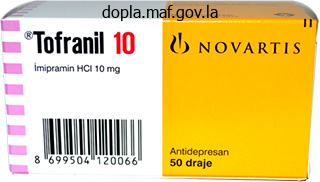
Imipramine 50 mg order
With body growth anxiety symptoms cures imipramine 50 mg for sale, the restriction created by the bone spicule leads to a is of nosocomial dermal origin. Progressive symptoms and signs are produced as the spine elongates during development, thereby stretch ing the caudally fixed cord. Others deteriorate neurologically at a later age (generally traction myelopathy, presenting with pain and progressive sensory, motor, and bladder symptoms, sometimes as late as adult life. Removal of the fibrous bony spicule and untethering of the spinal cord have been beneficial in some cases. There are a variety of other neurodevelopmental spinal abnormalities in the high cervical region, such as fusion of atlas and occiput or of cervical vertebrae (Klippel-Feil syndrome), congenital dislocation of the odontoid process and atlas, platybasia, and basilar impression. Several translations of his original material have been made, but they have been criticized as inaccurate. The main features were a flacdd bladder, asymmetrical weakness and atro phy of the forelegs, and a degree of spastidty in the legs. Use of the double eponym Amold-Chiari malformation is so entrenched that a dispute over its propriety serves little purpose. The incidence among adults, acquired from autopsy series and more recently, from incidentally discovered descent of the cerebellar tonsils on imaging procedures, is about If the patient survives to later childhood or adolescence, one of the syndromes that are more typical of the type I malformation may become manifest. In the more common type I Chiari malformation (without meningocele or other signs of spinal dysraphism), neurologic symptoms may not develop until adolescence or adult life. The symptoms are those of (1) increased intracranial pressure, mainly headache, (2) progressive cerebellar ataxia, (3) progressive spastic quadriparesis, (4) downbeating nystagmus, or (5) the syndrome of cervi cal syringomyelia (segmental amyotrophy and sensory loss in the hands and arms, with or without pain). Or the patient may show a combination of disorders of the lower cranial nerves, cerebellum, medulla, and spinal cord (sen sory and motor tract disorders), usually in conjunction with headache that is mainly occipital. This combination of symptoms is easily mistaken for multiple sclerosis or a tumor at the foramen magnum. The symptoms are usu ally chronic but may have an acute onset after sustained or forceful extension of the neck, as, for example, after a long session of dental work, hairdressing in women, or chiropractic manipulation. The physical habitus of such patients may be normal, but approximately 25 percent have signs of an arrested hydrocephalus, or a short "bull neck. The nature and severity of headache that are reason ably attributable to a Chiari malformation is somewhat unclear. Occipitonuchal pain with coughing, position change, or the Valsalva maneuver is the most depend able association, but even then, decompression may not relieve the symptoms. Only large and genuine malformations, not minor descent of the tonsils should be considered causative. More generalized headaches may or may not be explained by the finding of a Chiari malformation and the advisability of a surgical treatment then depends on the degree of disability created by other aspects of the malformation. Inspection of the axial sections of scans at the level of the foramen magnum demonstrates crowding of the upper cervical canal by inferiorly dis placed cerebellar tissue, but one must be aware of the variations in the normal position of the cerebellar tonsils at this level. A slight descent of the cerebellar tonsils that is reversible is also seen with low cerebrospinal fluid pressure and not indicative of a Chiari malformation.
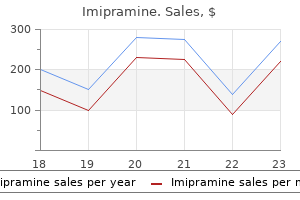
50 mg imipramine order
The point being made here is that these structures may also be involved in a number of noninfective processes anxiety symptoms duration buy 50 mg imipramine overnight delivery, some of obscure origin. The lower spinal roots or spinal cord alone may be implicated in "spinal arachnoiditis. The mechanisms by which these mningeal reac tions affect parenchymal structures (bram, cord, and nerve roots) are not fully understood. Pogressive constncon of nerve roots and spinal cord, hterally a strangulation of these structures, is another plausible mechanism, but it is difficult to separate vascular factors from mechani cal ones. Perivascular reactions of subpial vessels, as m Infectious processes, would be a plausible mechanism of injury to optic nerves and spinal cord, where long stretches of myelinated fibers abut the pia. It occurs after years of chronic syphilitic meningitis, sometimes in conjunction with tabes dorsalis or menin gomyelitis. However, there were always nonsyphilitic cases, the cause of which was never determined. A constriction of visual fields, usually bilateral and asym metrical (rarely scotomas), developed insidiously and progressed. Usually, there is sciatica and chronic pain in the back ru;d lower extremities, but sensorimotor and reflex changes m the legs are variable. Another form of spinal arachnoiditis, in which both the spinal cord and roots are entrapped in thickened pia-arachnoid, sometimes with arachnoid-dl adh sions, is a rare but well-known and often Idiopathic entity. Instillation of the anesthetic agent was followed immediately by back pain and a rapidly progressive lumbosacral root syndrome (areflexic paralysis, anesthesia of th legs, and paralysis of sphincters). Several cass have, m o recent experience, followed prolonged spmal anesthesia with the patient in a decubitus position, usually for orthopedic procedures, but the resulting myelopathy or cauda equina radiculopathy was difficul to separate from a direct toxic effect of the anesthetic. The term is somewhat confusing insofar as the pia and arachnoid may be equally involved in the inflammatory thickening and all three membranes are bound together by dense fibrous adhesions. It occurred mainly m the cervical region (hence the name pachymeningitis cervi calis hypertrophica) and was attributed to sypis. Involvement of cervical roots and compression of the spinal cord gave rise to variable degrees of parapa resis in association with root pain, paresthesia, sensory loss, and amyotrophy of the upper limbs. Idiopathic hypertrophic pachymeningitis continue to be reported; a s ummary of published cases and two person ally studied ones is given by Dumont and colleagues and by Jimenez-Caballero and coworkers. A condition associated with plasma cells prolif eration that contain IgG-4 receptors has been reported to involve the pachymeninges. The process has a similar appearance to rheumatoid granulomatous infiltration and it is responsive to corticosteroids.
Diseases
- Hypoparathyroidism familial isolated
- Pagon Bird Detter syndrome
- Colitis
- Hypocalcinuric hypercalcemia, familial type 1
- Hyperphenylalaninemia due to 6-pyruvoyltetrahydrop
- Encephalopathy-basal ganglia-calcification
- X-linked adrenal hypoplasia congenita
- M?llerian agenesis
Purchase imipramine master card
A rare paraneoplastic syndrome of spinal myoclonus with tonic spasms can occur and is assumed to be from inflammation of the spinal cord gray matter as discussed in Chaps anxiety medicine for dogs imipramine 75 mg order on line. The anti-Ma antibodies cross-react with testicular antigens and a search for a tes ticular tumor is undertaken (Voltz et al). Although rare, the clinical syndromes associated with the anti-Ma anti body and testicular tumors are diverse: limbic, brainstem, or hypothalamic inflammation and an ataxic-opsoclonic syndrome that is more typical of anti-Ri antibody (see earlier). Lung carci noma has been the most common source in the series of Yu and colleagues, with thymoma, renal cell, and other myelopathy is distinctly rare, being far less common than compression of the spinal cord from cancer and even less frequent than intramed ullary spinal cord metastases. Flanagan and colleagues have summarized a large series of their cases and described a variety of presentations including longitu dinally extensive involvement on imaging studies that simulate the p attern seen with anti-aquaproin antibod ies of Devic disease as described in Chaps. It c an therefore be said that there is a paraneoplastic type of neuromyelitis optica. The clinical features have been as diverse as for anti-Hu, including seizures, dementia, confusion, depression, as well as a variety of peripheral and cranial neuropathies and, sur prisingly, the Lambert-Eaton syndrome. There is subacute visual loss, disc swelling, and a cellular reaction in the vitreous. It is dif ficult for us to make sense of the clinical features aside from the optic neuropathy (really an optic neuritis), but they seem comparable to the perivenous inflammatory encephalitis and neuritis of the anti-Hu syndromes. Presumably this antibody accounts for some of the odd subacutely progressive syndromes previously thought to be antibody-negative; testing for this antibody might be included when an unusual paraneoplastic syndrome is suspected. The heterogeneity of antibody response to these expressed proteins may account for different clinical manifestations of the immune process but there is no certain evidence yet of their pathogenetic role. The "choree fibrillaire" of Morvan is an extraordi nary disorder of continuous muscle fiber activity, insom nia, and hallucinosis that may be caused by a paranee plastic antibody to voltage-gated potassium channels, as discussed in Chap. This same antibody, as well as acetylcholine receptor antibodies, has been associ ated with neuromyotonia of Isaac syndrome, seen in cases of lung cancer, lymphoma, and thymoma. The Lambert-Eaton st ndrome is perhaps the most com; mon paraneoplastic neurologic syndrome; it is associated with antibodies directed against calcium channels, as mentioned earlier. This disorder, which may occur con currently with other paraneoplastic syndromes such as cerebellar ataxia, is discussed in Chap. A myoc lonus syndrome without ataxia or opsoclonus is reported from time to time in the literature and probably is a deriva tive of one of the better-characterized antibody diseases. Three syndromes of radiation damage have been delineated: acute, early delayed, and late delayed, although these syndromes often blend into one another. The acute reaction may begin during the latter part of a series of fractionated treatments or soon thereafter. There may be a seizure, a transitory worsening of the tumor symptoms, or signs of increased intracranial pressure.
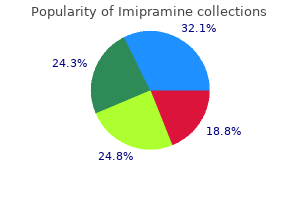
Imipramine 75 mg mastercard
Vahedi K anxiety scale 75 mg imipramine buy free shipping, Hofmeijer J, Juettler E, et al: Early decompressive sur gery in malignant infarction of the middle cerebral artery-a pooled analysis of three randomized controlled trials. Vander Eecken trial of stent-protected angioplasty versus carotid endarterec tomy in symptomatic patients: a randomized non-inferiority trial. Verreault S, Joutel A, Riant F, et al: A novel hereditary small vessel disease of the brain. Strand T, Asplund K, Eriksson S, et al: A randomized control trial of hemodilution therapy. Takebayashi S, Sakata N, Kawamura A: Reevalua tion of mili ary aneurysm in hypertensive brain: RecanaJization of small hemorrhage A, et al: Hyponatremia and cerebral infarction in pa tients with ruptured intracranial aneu rysms: Is fluid restriction harmful Among the vast array of neurologic diseases, cerebral trauma ranks high in order of frequency and gravity. In the United States, trauma is the leading cause of death in persons younger than 45 years of age and more than half of these deaths are a result of head injuries. According to the American Trauma Society, an estimated 500,000 Americans are admitted to hospitals yearly following cerebral trauma; of these, 75,000 to 90,000 die and even larger numbers, most of them young and otherwise healthy, are left permanently disabled. The basic problem in craniocerebral trauma is at once both simple and complex: simple because there is usually no difficulty in determining causation, namely, a blow to the head, and complex because of a number of delayed effects that complicate the injury. As for the trauma itself, little can be done, for it is finished before the physician or others arrive on the scene. At most there can be an assess ment of the full extent of the immediate cerebral injury, an evaluation of factors conducive to complications and further lesions, and the institution of measures to avoid such additional problems. Specifically, the neck can be stabilized and adequate perfusion and oxygenation can be secured. But of the disastrous intracranial phenomena that can be initiated by head injury, few offer possibili ties of treatment. New techniques of cellular biology are exposing phenomena that are set in motion by traumatic injury of nerve cells and glia. Some of these changes may be reversible, but at the moment, such knowledge is limited. It is a common misconception that craniocerebral injuries are matters that concern only the neurosurgeon and not the general physician or neurologist. Actually, 80 percent of head injuries are first seen by a physician in an emergency department, and fewer than 20 percent ever require neurosurgical intervention of any kind, and even this number is decreasing. The neurologist must be famil iar with the clinical manifestations and the natural course of primary brain injury and its complications and have a sound grasp of the underlying physiologic mechanisms. The present chapter reviews the salient facts concerning cranio cerebral injuries and outlines a clinical approach that the authors have found useful over the years. Matters pertaining to spinal injuries, often coexistent with head trauma, are considered in Chap. Certain terms have crept into the medical vocabulary and have been retained long after the ideas for which they stood have been refuted, attesting to the disadvan tage of premature adoption of explanatory terms rather than descriptive ones. The word concussion, for example, implies a violent shaking or jarring of the brain and a resulting transient functional impairment. Yet despite numerous postulates of physical changes within nerve cells, axons, or myelin sheaths (vibration effects, forma tion of intracellular vacuoles) that putatively occurred with concussion, confirmation of their existence has proved difficult in humans and experimental animals.
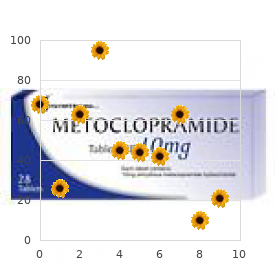
50 mg imipramine purchase with visa
The first manifesta tions are a regression of motor activity and an abnormal startle to acoustic stimuli anxiety symptoms 6 dpo purchase imipramine with american express, accompanied by listlessness, irritability, and poor reactions to visual stimuli. At first, axial hypotonia is prominent, but later spasticity and other corticospinal tract signs and visual failure become evident. Degeneration of the macular cells exposes the underlying red vascular choroid surrounded by a whitish gray ring of retinal cells distended with gan glioside. These are observed in the which normally cleaves the N-acetylgalactosamine from gangliosides. As a result of this deficiency, cerebral cortical neurons, Purkinje cells, retinal ganglion cells, and, to a lesser extent, larger neurons of the brain stem and spinal cord. The enzymatic defect can be found in the serum, white blood cells, and cultured fibroblasts from the skin or amniotic fluid, the latter giving parents the option of abortion to prevent a presently untreatable and fatal disease. Testing for hexosaminidase A also per mits the detection of heterozygote carriers of the gene defect. Fortunately, only three mutations account for 98 percent of the form that is common in individuals of Jewish ancestry. Biopsies of the rectal mucosa disclose glycolipid distention of the ganglion cells of the Auerbach plexus, but the need for this procedure has been obviated by enzyme analysis of white blood cells. Under the electron microscope, the particles of stored material appear as membranous cytoplasmic bodies. Retinal ganglion cells are distended with the same mate rial and, together with fat-filled histiocytes, cause the whitish gray rings around the fovea, where there are no nerve cells, as noted above. Tay-Sachs disease is untreatable but can be prevented by testing all individuals of Jewish origin for the recessive trait. In Sandhoff disease, which affects infants of non Jewish origins, there is a deficiency of both hexosamini dase A and B, moderate hepatosplenomegaly, and coarse granulations in bone marrow histiocytes. The clinical and pathologic picture is the same as in Tay-Sachs disease except for the additional signs of visceral lipid storage. In the second year, there are tonic-clonic or minor motor seizures and an increasing size of the head and diastasis of sutures with relatively normal-size ventricles; in the third year, the clinical picture is one of dementia, decerebration, and blindness. Occasionally, one can find basophilic granules in leukocytes and vacuoles in lymphocytes. There are no visceral, skeletal, or bone mar row abnormalities by light microscopy. Accordingly, the clinical expression of the variants appearing in childhood, adoles cence, and adult life takes the form of athetosis, dystonia, ataxia, and motor neuron paralysis; mental function can be normal. The process has also been found in a few congenital cases in which there was a rapidly progressive decline of a microcephalic infant.
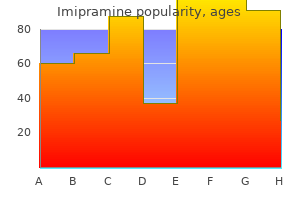
Purchase imipramine 50 mg with mastercard
These plateau waves anxiety symptoms frequent urination imipramine 25 mg purchase with mastercard, as they have come to be known, coincide with an increase in intracra nial blood volume, presumably as a result of a temporary failure of cerebrovascular autoregulation. Rosner and Becker have observed that plateau waves are sometimes preceded by a brief period of mild systemic hypotension. In their view, this slight hypotension induces cerebral vasodilatation in order to maintain normal blood flow. A cerebral or extracerebral mass such as brain tumor; cerebral infarction with edema; traumatic contusion; parenchymal, subdural, or extradural hematoma; or abscess, all of which tend to be localized and deform the adjacent brain. The brain deformation is greatest locally, being compartmentalized to a varying degree by dural partitions. In these disorders, the increase in pressure can reduce cerebral perfusion, but tissue shifts are minimal because the mass effect is uni formly distributed throughout the cranial contents. An increase in venous pressure because of cerebral venous sinus thrombosis, heart failure, or obstruction of the superior mediastinal or jugular veins. If the obstruction is within the ventricles or in the sub arachnoid space at the base of the brain, hydrocephalus results. If the block is confined to the absorptive sites adjacent to the cerebral convexities and superior sagittal sinus, the ventricles remain normal in size or enlarge only slightly, because the pressure over the convexities approximates the pressure within the lateral ventricles (see further on). In this situation, there may be a pressure gradient between the cerebral and spinal compartments, resulting in hydrocephalus. Then the clinical problem involves differentiation from other types of enlargement of the head with or with out hydrocephalus, such as constitutional macrocrania or an enlarged brain (megalencephaly; or hereditary meta bolic diseases such as Krabbe disease, Alexander disease, Tay-Sachs disease, Canavan spongy degeneration of the brain), and from subdural hematoma or hygroma, neonatal ventricular hemorrhage, and various cysts and tumors. Published guidelines suggest that monitoring should be undertaken in patients with severe traumatic brain injury if they are over 40 years of age, and have a Glasgow Coma Score below 9 (see Chap 35). Whether recent stud ies, such as the one by Chesnut and colleagues comparing monitoring to clinical and imaging in directing therapy, negate these guidelines is also uncertain. A comprehensive review can be found in the monograph on intensive care (Ropper) listed in the references. Papilledema may result in periodic visual obscurations; if it is protracted, optic atrophy and blindness may follow (see Chap. However, the main neurologic signs of a large intracranial mass, pupillary dilatation, abducens palsies, drowsiness, and the Cushing response, as discussed below and in Chaps. Any further elevations are followed immi nently by global ischemia and brain death. The sites of obstruction may be at the third ventricle, aqueduct of Sylvius, at the medullary foramina (Luschka and Magendie), or in the basal or convexity subarachnoid spaces. As stated earlier, in the infant or young child, the head increases in size because the expanding cerebral hemi spheres separate the sutures of the cranial bones. This form of obstruction results in enlargement of the entire ventricular system, including the fourth ventricle.
Japanese Persimmon. Imipramine.
- What is Japanese Persimmon?
- Are there any interactions with medications?
- High blood pressure, constipation, hiccough, stroke, excessive fluid, improving blood flow, and reducing body temperature.
- Are there safety concerns?
- How does Japanese Persimmon work?
- Dosing considerations for Japanese Persimmon.
Source: http://www.rxlist.com/script/main/art.asp?articlekey=97060
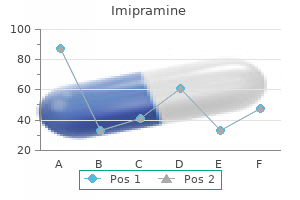
Imipramine 75 mg fast delivery
Tre atm e nt the skin tumors should not be excised unless they are cosmetically objectionable or show an increase in size anxiety in the morning 75 mg imipramine order otc, suggesting malignant change. Here one must resort to plastic surgery, but the results are not always satisfactory because the growths may encompass distal branches of cranial nerves (with risk of greater paralysis after surgical excision) or alter the underlying bone, the latter being either eroded from pressure or hypertrophied from increased blood supply. Cranial and spinal neuro fibromas are amenable to excision, and the gliomas and meningiomas usually demand surgical measures as well. Here the differentiation of hamartomas from gliomas of structures such as the optic nerves, hypothalamus, or pons may be difficult. Bilateral optic nerve gliomas are usually treated with radiation; unilateral ones are excised. Peripheral nerve tumors that have undergone malignant (sarcomatous) degeneration pose special sur gical problems. Affected individuals should be advised not to have children, a precaution that may not be necessary because fertility, especially in males, seems to be reduced by the disease. Prognosis varies with the grade of severity, being most favorable in those with only a few lesions. But the disease is always progressive, and the patient should remain under surveillance. Krabbe (1932, 1934) showed conclusively that the calcification lay not in the blood vessels (as Dimitri and many others had concluded), but in the second and third layers of the cortex (see Wohlwill and Yakovlev for histori cal review and bibliography). A vascular nevus is observed at birth to cover a large part of the face and cranium on one side (in the territory of the ophthalmic division of the trigeminal nerve). The lesions vary in extent, the most limited being an involvement of only the upper eyelid and forehead, and the most exten sive being the entire head and even other parts of the body. The skin lesion is deep red (port-wine nevus) and its margins may be flat or raised; soft or firm papules, evi dently composed of vessels, cause surface elevations and irregularities. Orbital tissue, especially the upper eyelid, is almost invariably involved; congenital buphthalmos may enlarge the eye before birth and glaucoma may develop later in that eye, causing blindness. The increased cutaneous vascularity may result in an overgrowth of connective tissue and underlying bone, giving rise to a deformity like that of the Klippel-Trenaunay-Weber syndrome. Indications of cere bral disease appear as early as the first year of life or later in childhood; the most frequent clinical manifestations are unilateral seizures followed by increasing degrees of spastic hemiparesis with smallness of the arm and leg, hemisensory defect, and homonymous hemianopia, all on the side contralateral to the trigeminal nevus. Skull films (usually normal just after birth) taken after the second year reveal a characteristic "tramline" calcification, which outlines the involved convolutions of the parietooccipital cortex. It is not the case that all cranial hemangiomas affect the cerebrum; the common facial nevi, especially the flat midline ones and the elevated strawberry nevi, are of no neurologic significance.
Safe imipramine 25 mg
The seriousness of the condition is further emphasized by the associated mortality rate of 20 percent in the newborn period and the 25 percent rate of neurodevelopmental disability in survivors anxiety uti purchase imipramine 50 mg on line. Ultrasonograph demonstration of subependymal matrix hemorrhage in a premature infant (arraw). Although it is evident that many newborns suffer some degree of perinatal asphyxia, relatively few seem to manifest brain dam age. Moreover, many, if not most, infants with a variety of cerebral motor syndromes appear to have passed the parturitional (perinatal) period without mishap, indicat ing the greater importance of other prenatal and postna tal causative factors. Nonetheless, severe neonatal asphyxia of term or preterm babies can be an important cause of spastic, dystonic and ataxic syndromes, often accompa nied by seizures and mental delay in development. This field has been sullied by an unprecedented rise in malpractice litigation, spawned in part by the belief that early detection of asphyxia and rapid delivery would have prevented the motor, epileptic, and cognitive problems of birth injury. The fallacy of this assumption is highlighted both by the below comments and by the observation that the incidence of cerebral palsy has not changed in term infants over the past 30 years, despite the institution of fetal monitoring and more frequent cesarean sections. One has the impression that the brain tolerates hypoxia and reduced blood flow in the immediate post natal period better than at any other time in life. Not until the arterial oxygen tension is reduced dramatically to 10 to 15 percent of normal does brain damage occur, and even then the impaired function of other organs contributes to the damage. It is probably correct to think of the encepha lopathy in terms of both hypoxia and ischemia, both of which usually occur in utero and are expressed postna tally by recognizable clinical syndromes. Fenichel (1990), following the original work of Samat and Sarnat and of Levene and colleagues, has found it helpful to divide the encephalopathies that follow a complicated birth into three purely descriptive groups according to their severity, each having a prognostic value beyond that of the Apgar score: (1) In newborns with mild hypoxic-ischemic encephalopathy, the symp toms are maximal in the first 24 h and take the form of hyperalertness and tremulousness of the limbs and jaw (the "jittery baby") and a low threshold of the Moro reac tion. The tone of the limbs is normal except for a mild increase in head lag during traction. After 48 to 72 h, the neonate may improve (having passed through a jittery hyperactive phase) or worsen, becoming less responsive in association with convulsions, cerebral edema, hyponatremia, and hyperarnmonemia from liver damage. Fenichel associates epi leptiform activity and voltage suppression with an unfa vorable outcome. The limbs are hypotonic and motionless even during attempts to elicit the Moro response. Sucking and swallowing are depressed or absent, but pupillary reactions and eye movements may at first be retained, only to be lost as the coma deepens. It is in the second and third categories, that is, the states of moderate to severe encephalopathy, where cor rection of the respiratory insufficiency and the metabolic abnormalities permits survival, that a number of motor abnormalities (corticospinal, extrapyramidal, and cer ebellar) and developmental delay eventually emerge. Included in the category of severe hypoxic-ischemic encephalopathy are also newborns with a variety of developmental anomalies of the brain and other organs.
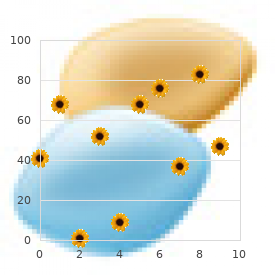
Imipramine 50 mg purchase
Viscera have a double-nerve supply anxiety 7 cups of tea generic imipramine 75 mg visa, sympathetic and parasympathetic and in general these two parts of the autonomic nervous system exert opposite effects. For example, the effects of the sympathetic nervous system on the heart are excitatory and those of the parasympathetic inhibitory. However, some structures-sweat glands, cutaneous blood vessels, and hair follicles-receive only sympathetic postganglionic fibers, and the adrenal gland, as indicated earlier, has only a preganglionic sympathetic innervation. Most of the neuropeptides exert their postsynaptic effects through the G-protein transduc tion system, which uses adenyl cyclase or phospholipase C as an intermediary. The neuropeptides act as modulators of neural transmission, although their exact function in many cases remains to be determined. Adrenergic receptors are of two types, classified orig rohumoral transmission had its beginnings in the early inally by Ahlquist as alpha and beta. In general, In 1921, Loewi discov receptors mediate vasoconstriction, relaxation of the gut, and dilatation of the pupil; beta receptors mediate vaso dilatation, especially in muscles, relaxation of the bronchi, and an increased rate and contractility of the heart. Alpha 1 receptors are postsynaptic; alpha2 receptors are situated on the presynaptic membrane and, when stimu lated, diminish the release of the transmitter. Beta 1 receptors are, for all practical purposes, limited to the heart; their activation increases the heart rate and contractility. Beta2 receptors, when stimulated, relax the smooth muscle of the bronchi and of most other sites, including the blood vessels of skeletal muscle. A comprehensive account of neurohumoral transmission and receptor function can be found in the monograph by Cooper and colleagues. Also, in 1920, Cannon reported that stimulation of the sympathetic trunk released an epinephrine-like substance, which increased the heart rate and blood pressure. As stated ear lier, the integration of these two systems is achieved pri marily in the hypothalamus. In addition, the endocrine glands are influenced by circulating catecholamines, and some of them are innervated by adrenergic fibers. Both the autonomic and endocrine systems influence the muscular, cutaneous, and mesenteric (splanchnic) vascular beds, heart rate, and stroke volume of the heart. Together, these actions serve to maintain normal blood pressure and allow reflex maintenance of blood pressure with changes in body position. Two types of baroreceptors function as the afferent component of this reflex arc by sensing pres sure gradients across the walls of large blood vessels. Those in the carotid sinus and aortic arch are sensitive to reductions in pulse pressure (the difference between sys tolic and diastolic blood pressure), while those in the right heart chambers and pulmonary vessels respond more to alterations in blood volume. The carotid sinus barorecep tors are rapidly responsive and capable of detecting beat to-beat changes, in contrast to the aortic arch nerves, which have a longer response time and discriminate only the larger and more prolonged alterations in pressure. In response to increased stimulation of these receptors, vagal efferent activity is reduced, resulting in reflex cardioacceleration. Thus, vagal activity results in reduction in heart rate and in the contractile force of the myocardium (negative inot ropy).
Imipramine 25 mg low price
In humans anxiety 120 bpm purchase imipramine, all these spirochetoses, if untreated, induce a subacute or chronic illness that evolves in ill defined stages, with early spirochetemia, vascular damage in many organs, and a high level of neurotropism. As in syphilis, the nervous system is invaded early in the form of asymptomatic meningitis. Later, neurologic abnormalities appear, but only in small a proportion of such cases. Unlike syphilis, peripheral and cranial nerves are often damaged (see further on and Chap. Immune factors may be important in the later phases of the disease and in the development of the neurologic syndromes. Lyme disease is less acute than leptospirosis (Well disease) and less chronic than syphilis. It successively involves the skin, nervous system, heart, and articular structures over a period of a year or longer although one aspect or another may predominate. Penicillin is so much preferred that even these patients are ideally desensitized to the drug. The Jarisch-Herxheimer reaction, which occurs after the first dose of penicillin and is a matter of concern in the treatment of primary syphilis, is of little consequence in neurosyphilis; it usually consists of no more than a mild temperature elevation and leukocytosis. The effects of treatment on certain symptoms of neu rosyphilis, especially of tabetic neurosyphilis, are unpre dictable and often little influenced by treatment with penicillin; they require symptomatic measures. Atropine and phenothiazine derivatives are said to be useful in the treatment of visceral crises. Followup should include clinical examinations at approx imately 12 months and another lumbar puncture. Lyme borreliosis has a worldwide distribution but the typical neurologic manifestations differ slightly in Europe and America, as emphasized in the review by Garda-Monico and Benach (as does the serologic testing). In the United States, where approximately 15,000 cases are reported annually, the disease is found mainly in the Northeast and the North Central states. In 60 to 80 percent of cases, a skin lesion (erythema chronicum migrans, or erythema migrans) at the site of a tick bite is the initial manifesta tion, occurring within 30 days of exposure. It is a solitary, enlarging, ring-like erythematous lesion that may be surrounded by annular satellite lesions. Usually fatigue and influenza-like symptoms (myalgia, arthralgia, and headache) are associated, and these seem to be more prominent in the North American (B. This assumes importance in patients who may have acquired the ill ness in another part of the world in whom the correct diagnosis may be missed if the specific antibody for the regional organism is not sought. The European variant has a propensity to cause the painful lymphocytic menin goradiculitis, Bannwarth syndrome, as summarized in the review by Pachner and Steiner. Weeks to months later, neurologic or cardiac symp toms appear in 15 and 8 percent of the cases, respectively. Still later, if the patient remains untreated, arthritis or, more precisely, synovitis develops in approximately 60 percent of the cases.
Fasim, 42 years: More recent studies of the subtelomeric parts of chromo somes reportedly find abnormalities in another 7 percet of severely retarded children (Knight et al). Linn J, Halpin A, Demaerel P, et a l: Prevalence of superficial sid erosis in patients with cerebral amyloid angiopa thy. The presence of a fracture may increase these odds but most studies, such as the one by Lloyd and colleagues have found that the presence of a skull fracture in children proves to be a relatively poor indicator of intracranial injury.
Mezir, 49 years: The most severe instances of this type of centrally provoked hypertensive syndrome have occurred in children with cerebellar tumors who presented with headache and extreme systolic hyperten sion. Histologically, this group of para neoplastic disorders is characterized by extensive loss of neurons, accompanied by microglial proliferation, small patches of necrosis, and marked perivascular cuffing by lymphocytes and monocytes. There is rapid filing of the cerebral venous system after injection of contrast into one internal carotid artery.
Innostian, 38 years: However, their separation is of fundamental importance in diagnosis and therapeutics. In a few instances of diffuse brainstem glioma, surgical exploration is neces sary to establish the diagnosis (inspection and possibly biopsy). The remainder of this discussion is concerned with disease of the in ternal carotid artery.
Arokkh, 57 years: In some cases, cerebral hemorrhage is quite extensive, similar to a primary hypertensive hemorrhage. Delayed Hemiplegia the main causes of delayed hemiplegia are a late-evolving epidural or subdural hematoma and, in more severe injuries, an intracerebral hemorrhage. There are also "J-type" receptors in the lung interstitium that are acti vated by substances in the interstitial fluid of the lungs.
Luca, 59 years: Prog ressive Externa l Ophthal moplegia and Kea rns-Sayre Syndrome (See also Chap. Very small pontine hemorrhages may be overlooked because of the artifact produced by adja cent bone. Reports of substan tial familial aggregations of dementia without a specific pattern of inheritance also suggest the operation of more than one genetic factor.
Runak, 56 years: When the nevus lies entirely below the upper eyelid or high on the scalp, a cerebral lesion is usually absent, although in a few instances such an angioma has been associated with a vascular malformation of the meninges overlying the brainstem and cerebellum. There is a tendency to repeat a question before answering it, and later there may be a rather dramatic repetition of every spoken phrase (echolalia). While the first of these favored a surgi cal approach for severe symptomatic stenosis, the second gave equivalent results of approximately 6 percent com bined stroke and death rates with either procedure.
Shakyor, 33 years: Recent functional studies have shown that a limited proportion of patients who are in a vegetative or minimally conscious state can be trained to purposefully engage parts of the cerebrum. Taivassalo T, Abbott A, Wyrick P, et al: Venous oxygen levels during aerobic exercise: An index of impaired oxidative metabolism in mitochondrial myopathy. Schroeder C, Vervino S, Birkenfeld A, et al: Plasma exchange for primary autoimmune autonomic failure.
Peratur, 40 years: This may be difficult, for the lipoma may be fused with the dorsal surface of the spinal cord. In Angiostrong1;lus infections, snails, freshwater prawns, and unwashed lettuce carry the nematode. For each of the aforementioned pro cesses, wide clinical experience will bring to light an individual or a family in whom some odd syndrome has been linked to a mitochondrial disorder.
Marik, 54 years: Weakness and tiredness of the legs are frequent complaints, although examination discloses no paresis or ataxia. Treatment Antibiotic treatment seems to be effec tive only if implemented during the initial febrile phase. Some babies are constantly on the move, wiry, and hard to hold; others are placid and slack as a sack of meal.
Trompok, 26 years: Hamartin and tuberin function as tumor sup pressor proteins and interact to suppress cell growth. A rrows incticate point of application and direction of force; dark red areas incti. The brain in such cases shows one or more foci of inflamm a tory necrosis, essentially an abscess.
Torn, 28 years: These findings have been the basis of several hypoth eses (one of which attributes the cerebral symptoms to mechanical obstruction of the vessels), but none is entirely satisfactory. Together, these actions serve to maintain normal blood pressure and allow reflex maintenance of blood pressure with changes in body position. The clinical trial con ducted by Einhaupl and colleagues generally settled the question of therapy in favor of aggressive anticoagula tion, but this could not be confirmed by de Bruijn and coworkers, who found a minimal difference between patients who were treated with low-molecular-weight heparin followed by oral anticoagulation.
8 of 10 - Review by Q. Gorn
Votes: 204 votes
Total customer reviews: 204
